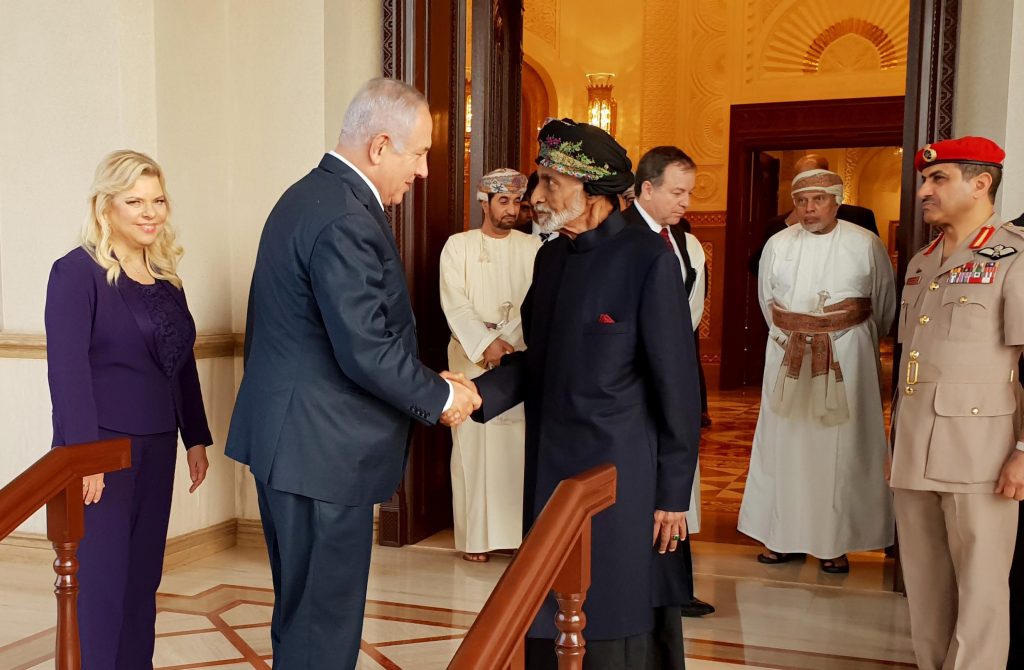Australia/Israel Review
Oman as Israel’s link to the Middle East?
Nov 28, 2018 | Ronen Bergman

In the fall of 1979, two Israelis carrying foreign passports arrived on a flight to Muscat, the capital of Oman. One of them was Reuven Merhav, a senior Mossad official dealing with matters concerning the Middle East, who would later become the director general of the Ministry of Foreign Affairs. The other was a member of the IDF’s General Staff, Maj. Gen. Menachem (Mendy) Maron. After landing, the two were transferred to a luxurious villa in Muscat and from there flown on a royal jet to meet with Sultan Qaboos at an encampment outside the capital. They were amused by the fact that the bathroom on the plane, including the toilet itself, was made of gold.
The discussions lasted into the night, following which the guests went on a covert visit to a tiny Omani enclave called Ras Musandam at the edge of the Musandam Peninsula, which essentially controls the Strait of Hormuz – the global oil gateway.
“The importance of that meeting was in its very existence,” Merhav recounted recently. “These are direct ties, though covert, with an important Arab country at a highly important strategic location.”
This meeting was one of many held since the early 1970s between senior Israeli officials and officials in Oman. The ties with Oman opened the door to important covert ties with other countries in the gulf, primarily the United Arab Emirates and Qatar.
The public visit and the royal reception Israeli Prime Minister Binyamin Netanyahu received over the weekend of Oct. 27-28, was the result of four months’ work, led by the Mossad. It’s safe to assume Mossad Director Yossi Cohen visited Muscat to finalise the details of that visit.
Some of the Israeli officials involved in the covert ties with Oman could not help but wonder why is the Sultan suddenly willing to have such a public and broadly covered visit now? The answer to that will not be found in Jerusalem. Sultan Qaboos wants to show a different side of his country to the West: a more liberal and tolerant side. Netanyahu’s visit was scheduled before the Khashoggi assassination by the Saudis, but that terrible event definitely served the Sultan’s needs in showing the world that Oman is different.
Israel’s possible gain from this visit is threefold. Primarily, Oman can serve as a channel to many countries – including Iran, Qatar and Syria – and is seen by all as an honest broker. Through Oman, Israel could establish covert ties with any player in the region. This, of course, is conditional upon the agreement of that player, but under Sultan Qaboos’ sponsorship, things are a lot simpler. A senior Israeli official even said that he doesn’t “rule out the use of Oman to open a secret channel with Iran and Syria.”
Secondly, the hope is that other countries would take courage from this visit and also expose their own covert ties with Israel.
Finally, for Netanyahu, exposing the ties with Oman is another layer in his Middle Eastern strategy, which includes creating covert alliances – and public ones whenever possible – with moderate Sunni nations and movements, in an effort to prevent Iran’s spread throughout the region, as well as undermine Teheran’s regional power, all the while proving that Israel can normalise its ties with Arab nations even without solving the Palestinian issue.
There is no doubt Netanyahu’s public trip to Muscat was an important diplomatic achievement, but it’s doubtful it could lead to normalisation with many other Arab countries. It would be far more convenient and safe for the rulers of most of these countries to have close ties with Israel, but quietly, for fear of enraging their citizenry.
Ronen Bergman is a senior political and military analyst for Yedioth Ahronoth, Israel’s largest-circulation non-free daily newspaper. He is the author of eight books, the most recent of which is the best-selling Rise and Kill First: The Secret History of Israel’s Targeted Assassinations (Random House, Jan. 2018). © Yediot Ahronot (ynet.com), reprinted by permission, all rights reserved.
Tags: Gulf states, Israel






